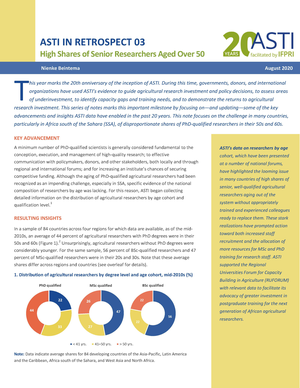Authors:
Nienke Beintema
Year:
2020
Publisher
International Food Policy Research Institute
Back to:
2020 marks the 20th anniversary of the inception of ASTI. To highlight this important milestone, the program released a Series of Notes focusing on—and updating—some of the key advancements and insights ASTI data have enabled in the past 20 years. This note focuses on the challenge in many countries, particularly in Africa south of the Sahara (SSA), of disproportionate shares of PhD-qualified researchers in their 50s and 60s.
A minimum number of PhD-qualified scientists is generally considered fundamental to the conception, execution, and management of high-quality research; to effective communication with policymakers, donors, and other stakeholders, both locally and through regional and international forums; and for increasing an institute’s chances of securing competitive funding. Although the aging of PhD-qualified agricultural researchers had been recognized as an impending challenge, especially in SSA, specific evidence of the national composition of researchers by age was lacking. For this reason, ASTI began collecting detailed information on the distribution of agricultural researchers by age cohort and qualification level.
In a sample of 84 countries across four regions for which data are available, as of the mid2010s, an average of 44 percent of agricultural researchers with PhD degrees were in their 50s and 60s. Unsurprisingly, agricultural researchers without PhD degrees were considerably younger. For the same sample, 56 percent of BSc-qualified researchers and 47 percent of MSc-qualified researchers were in their 20s and 30s. Note that these average shares differ across regions and countries.

